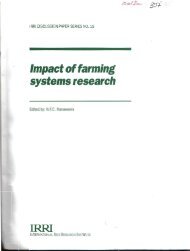Naz, Antonia Corinthia C and Mario Tuscan N. Naz. 2006. Modeling ...
Naz, Antonia Corinthia C and Mario Tuscan N. Naz. 2006. Modeling ...
Naz, Antonia Corinthia C and Mario Tuscan N. Naz. 2006. Modeling ...
You also want an ePaper? Increase the reach of your titles
YUMPU automatically turns print PDFs into web optimized ePapers that Google loves.
Both groups were in favor of a proposal that if they are not able to pay their<br />
garbage fees, a household member or employee of a business establishment shall render<br />
community service for one day for the month that his household was not able to pay<br />
their garbage fees. Community service includes helping in barangay clean up <strong>and</strong><br />
beautification programs <strong>and</strong> other projects. About 76 percent of the respondents were in<br />
favor of this proposal. Other suggestions were to add a penalty or surcharge to their<br />
garbage fees for the next month, <strong>and</strong> that the barangay captain should not issue the<br />
business establishment or its owner a barangay clearance. (A barangay clearance is a<br />
requirement for a business permit).<br />
Aside from paying their garbage fee, the business establishments were willing to<br />
help the ECOSWAM program through: proper solid waste management; volunteering to<br />
help clean the barangay; <strong>and</strong> donations in cash or in kind to the ECOSWAM program.<br />
When asked what external sources of funds the Tuba municipal government<br />
should tap in order to finance its ECOSWAM program, the top three answers were: (1)<br />
ask for financial assistance from the provincial <strong>and</strong> national governments; (2) ask for<br />
assistance from the Congressman <strong>and</strong> (3) ask for donations from private companies.<br />
5.0 WILLINGNESS-TO-PAY CHOICE MODEL RESULTS<br />
5.1 Response to Choice Sets According to Price Levels<br />
Most of the household responses favored the base option (lowest price) in the<br />
pilot study <strong>and</strong> second pre-test. This situation changed in the third pre-test <strong>and</strong> final<br />
survey, when the researchers (a) removed the label of “base” case <strong>and</strong> presented this as<br />
option 2, instead of option 1, (b) added more pictures to the choice sets <strong>and</strong> (c)<br />
highlighted the differences between the two options in each choice set. Most of the<br />
business establishments chose the base case of PhP 8 per sack of waste. However, they<br />
preferred the alternative option in some choice sets.<br />
Figure 3: Households’ Responses to Choice Sets Figure 4: Business Establishments’ Responses to Choice Sets<br />
21%<br />
Price of ECOSWAM Service per Week<br />
19.6%<br />
15<br />
20<br />
10<br />
22%<br />
5<br />
37.4%<br />
19%<br />
Price per Sack of Waste<br />
8.5%<br />
8.3%<br />
20<br />
15<br />
10<br />
5<br />
64.2%<br />
21
















